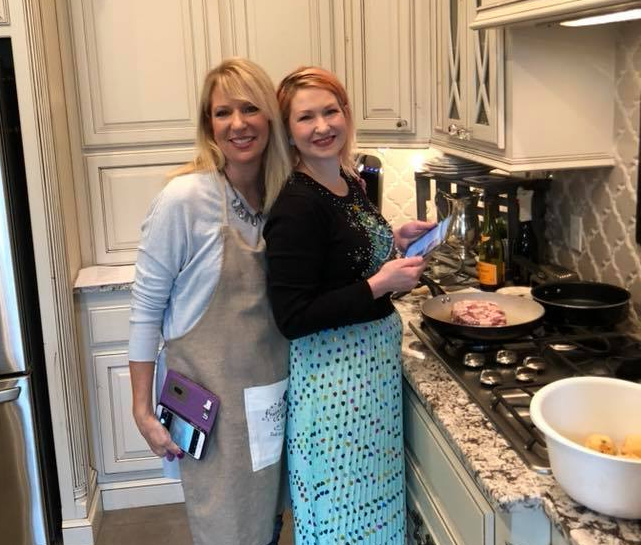It took a game of tennis for me to realize that Brittany’s choices don’t measure my success as a parent.

Brittany took the last load out of the dryer and stuffed a pile of vintage t-shirts and thrift store finds in the white plastic laundry basket.
“These aren’t quit dry yet,” I said as I felt one of the waistbands of her favorite torn-up jeans. Hoping she’d stay a bit longer I opened the pantry. “I can put some cookies in the oven.”
“That’s okay, Mom. At least they’re clean. I gotta go.” Brittany slung her backpack over her shoulder. A slender piece of wood and silver clinked as it landed on the travertine tile floor.
“You dropped something, Brit,” I said bending down.
Brittany whirled around. Her face was white.
Picking up the object, I gasped. “A pipe? You’re smoking pot now?” I screamed.
I couldn’t believe it. My timid freckle-faced artist was going down the same path as her father. Of all people, she should know better.
“It’s no big deal,” Brittany argued. “But if you must know, that’s why I moved out. You’re always keeping tabs on my life. It’s like you’re a score keeper.”
**
When my first marriage ended in divorce, I thought the shame of dealing with my ex-husband’s drug addiction was a thing of the past. I never dreamed it would come back to haunt me.
Tom (not his real name) and I were married for ten years and had three children together, Brittany, Garrett and Jake. Brittany was our oldest. From the time she was three we spent our days baking cookies and designing t-shirts with slick paint. For holidays and birthdays we’d cruise the fabric stores for material to sew matching outfits. I grew up with three brothers so having a daughter was a delight.
Although Brittany was ten when we divorced, she didn’t comprehend what caused it or that it was final. “Why is Dad staying at Nanny and Papa’s so long? When is he coming back home?” she’d ask.
From her perspective, there was no need to worry. This was just another one of our many separations. Besides that, our divorce came with great perks—weekend visitations at Nanny and Papa’s. Tom’s parents were raising his sister’s three children. Despite the obvious chaos of six kids and three adults crammed into a two-bedroom home, to Brittany it was an extended slumber party of sheer delight with her favorite cousin and best friend, Mariam, to play with.
When Tom realized he couldn’t woo me back with empty promises, he targeted Brittany and her childlike hope.
“I’m getting a car soon and going back to work. Then I’m taking you and the boys to Disney World!”
Brittany and her brothers never saw Mickey Mouse, and with each passing year, her father’s empty promises held less weight.
One weekend Brittany came home with a downcast face.
“What’s wrong?” I asked.
“Dad promised to take us to the movies!” she sobbed. “I should have known better. He sleeps the whole time we’re there. Mariam and I tried wake him up five times. We even tickled his nose with a feather, but he didn’t budge.”
By the time Brittany entered her teens the weight of her father’s empty promises eroded her confidence in anything he said.
“I don’t care if I see my dad on the weekends anymore. If Mariam isn’t going to be there, I don’t want to go.”
Like a turtle retreating into its shell, my once happy-go-lucky girl turned inward. She quit the soccer team and lost interest in ballet and youth activities at church.
I had high hopes of her going to college, but after graduation Brittany announced that she wanted to take a year off. She withdrew further, spending hours listening to gothic rock and drawing faux tattoos on her arms, her jeans, her shoes—anything that absorbed ink was a target for her Sharpie marker.
A year later, Brittany enrolled in a local college but insisted on moving out. “You have too many rules, Mom! No one my age has a curfew and I’m tired of you trying to control what movies I watch or what music I listen to.”
After Brittany moved out her only trips home were to catch up on laundry. When I asked about her classes, she got defensive. Then during her second semester she announced, “I’m not going back. I’m flunking most of my classes anyway.”
I couldn’t help but blame myself. If Brittany had grown up in a peaceful stable home, she wouldn’t have so many demons to fight.
I offered to send her to counseling but she refused to go.
“Counseling? What do I need that for? There’s nothing wrong with me. I’m just having fun.”
I hated it when my friends asked how Brittany was doing. Their daughters were pledging sororities, getting married or having babies. What was I supposed to say—she’s smoking weed and flunking college? Internal critiques harassed me daily but like a belt that was one notch too tight, I stuffed the shame.
One Spring day I got a phone call from the Warr Acres police department.
“Mom, I got picked up for drug possession. Can you bail me out?”
Her request was as casual as if she were asking to borrow a pair of jeans. How could she make choices like this, especially after what drugs have done to our family?
By the time bail was arranged, Brittany was transferred to the Oklahoma county jail. When I arrived the next morning to pick her up, she was waiting outside on a bench bouncing alone to music on her iPod.
I tapped the horn. Brittany skipped to the car like I was picking her up from kindergarten. She pulled her ear buds out and plopped down on the front seat. “Jail wasn’t so bad,” she boasted. “I even made some friends.”
My anger fumed like hot lava.
“And oh,” she smirked, “you’ll never guess who transported me last night from the Warr Acres jail to county…Pastor Michael.”
My eyebrows raised higher than the Saint Louis arches. Officer Anderson was on staff at our church for years. In fact, Brittany often babysat for his children. We still referred to him as Pastor Michael even though he now served on the Warr Acres police force.
“Yeah, I got the mini sermon-slash-lecture on the way, but hey—what else could I expect?”
I mused at the Lord’s providence. Of all the officers in the city, she received a divine escort. Brittany may have been the only person in Pastor Michael’s “mobile congregation” that day, and even though she mocked his theology he delivered a sermon just the same.
“Brittany, don’t you know,” I said glancing her way as I changed lanes, “there’s nowhere you can go that God can’t find you?”
She rolled her eyes.
Brittany’s freedom came with a huge price. Her drug possession penalties included court costs, attorney fees, mandatory drug tests and court ordered physical training sessions every Saturday morning at 7:00 am—torture for teens who like to sleep in. I hated to see her endure so much but I prayed that she would learn from her mistakes and want to come back home.
Instead she quit working and couch surfed where ever she could. As much as I prayed for Brittany, it seemed God was more concerned about working patience and forgiveness in me.
One day while setting dinner plates on the table the phone rang. The caller id displayed an unfamiliar number. “Hey Mom, it’s Brit. I know you’re worried that I lost my job, but I just wanted to let you know I’m okay. I’m staying with a new friend. Her name is Bri. She still lives at home with her parents, but they’re cool with me here.”
She’d rather live with strangers than her own family? A tear smudged my recipe.
“Oh that’s nice,” I managed to reply.
“Bri’s really into art also. We’ve been going to a lot of art shows, and this really cool church, too.”
“Church?” I said, trying to conceal my shock as I stirred the spaghetti simmering on the stove.
“Yeah, this church is amazing—very laid back. I’ve been taking some art classes there. They even let you paint during the sermon if you want.”
For several months, Brittany remained unemployed and stayed with her friend. I didn’t have a relationship with Bri’s mother but I prayed she wouldn’t continue to enable Brittany to live there without a job or college enrollment. Just before the spring semester started, my prayers were answered. Bri’s mother, who worked for an attorney, laid down the law, requiring her own children as well as Brittany to sign a “Family Life Contract.” The contract listed behavior required in exchange for free room and board. One requirement was full-time college attendance. Along with these new boundaries, however, Bri’s mother also exercised compassion. She convinced the attorney she worked for to represent Brittany pro-bono on her drug charges.
When Brittany told me about the contract, I couldn’t help but laugh inside. She’d collided right back into the very thing she was running from—rules. Now that constant expectations weren’t coming from me, our relationship began to improve.
One summer day the sun sparkled in my kitchen window. My heart swelled with gratitude. In two months Brittany would be off probation. I felt like I was getting my daughter back. A week later, however, Brittany called with some bad news. “Mom, I got a DUI last night.” I fell on my knees again and sobbed. Where did I go wrong? She knows better!
I walked outside to get the mail just as my friend Juli rounded the corner in her white Tahoe. She pulled up to the curb and rolled down the window to say hi.
“On your daily Sonic run?” I teased.
“How’d you guess?”
I gave a half-hearted wink.
“What’s wrong?” Juli asked.
“Oh, it’s Brit again. I feel like such a failure. I just found out she got a DUI. I keep wondering where I went wrong.”
“What makes you think her DUI is your fault?”
“I should have done more for Brittany.”
Juli tucked a wayward strand of blonde hair behind her ear. “Can I ask you a question?”
“Sure,” I sighed.
“If Brittany always made good decisions, would you take the credit?”
“Well, yes,” I exclaimed. “I raised her right.”
“And if she fails you take the blame?
I hung my head. “I guess.”
“It sounds to me like you are taking credit for Brittany’s decisions, but the reality is that she has her own free will.” Juli paused for a moment and continued. “God was the perfect parent and Adam and Eve rebelled. Did that make God a bad parent?”
My eyes widened. “Of course not!”
And neither are you, Christy. You are a great mother. Seriously, the best thing you can do for Brittany is to love and accept her just like she is, even when she makes mistakes.
A few weeks later Brittany called.
“Hey Mom, you want to hang out?”
Although I was thrilled to spend time with Brittany, our conversations often ended in disagreements. “Sure.” I paused. “What did you have in mind?”
“How about some tennis? You could meet me at the tennis court Monday night and we could knock around a few balls.”
“That’s a great idea!” I said, relieved that not much talking would be required. “Tennis is perfect.”
When I arrived at the court, Brittany was doing some stretches to warm up. Her blonde pony tail bobbed back and forth as she ran to give me a hug. “Hi Mom,” she said with gleaming eyes and a smile matching the 90 degree temperature. “Just gotta warn ya. Don’t judge me by my cute outfit. I’m really not as good as I look.”
Brittany did her best impression of Maria Sharapova as she threw the ball in the air and swung her racket to serve the ball. It grazed the net and landed right in front of me. I swung back with the perfect aim but missed.
“You’re not that good either!” she joked. “Are you sure there’s not a hole in your racket?”
“Funny Britt,” I smiled as I wiped my brow. “At least this is great exercise.”
Ten minutes later, we stopped to gather up the balls that landed in the other courts.
“You know, Mom. I’m glad you’re not any better than me. We’re actually a good match. Let’s don’t keep score. Let’s just focus on having fun!”
As I threw the ball up to serve, Brittany’s words resonated truth within me. I had kept score for far too long and missed out on a lot of fun. Keeping record of her shortcomings not only damaged our relationship, but it put a burden of defeat on me that was too heavy to carry. As I wacked the ball over the net, I felt years of frustration leave. It took a game of tennis for me to realize that Brittany’s achievements don’t measure my success as a parent—love does.
I left my shame at the tennis court that night, along with a couple of balls we couldn’t find. Today Brittany and I enjoy doing many other things together. On Saturday mornings we grab a cup of coffee and hunt down vintage items at local estate sales. And now when my friends ask how Brittany is doing I no longer lower my head in regret. I tell my friends, “She is amazing!”
I say and mean it—because in life and in relationships…things are better when we don’t keep score.


I had to stop reading this in the middle, pause, and cry and pray for my family 💔 Thank you for sharing your story, Christy❤
Christy,
This speaks right to my current situation. Am a single mum, blessed with a beautiful bright girl with so much potential but makes many wrong choices. Thanks for reminding me she has her own free will, and that God only can pursue her.
Wanjikui and Sarah Beth, never forget that in the middle of our story, God is working on our children….and us as well!
Christy this got buried in my email so I just read it. Thanks for that prayer I receive it, I know I need it! I’m still working through this year’s M day issue and disappointment because he somehow made it MY fault again!